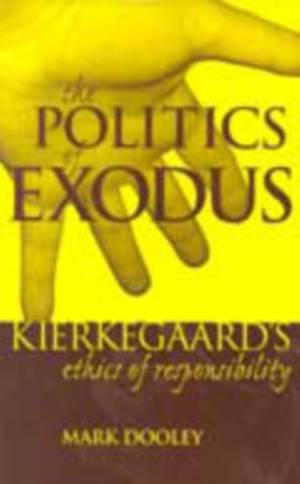
Bedankt voor het vertrouwen het afgelopen jaar! Om jou te bedanken bieden we GRATIS verzending (in België) aan op alles gedurende de hele maand januari.
- Afhalen na 1 uur in een winkel met voorraad
- In januari gratis thuislevering in België
- Ruim aanbod met 7 miljoen producten
Bedankt voor het vertrouwen het afgelopen jaar! Om jou te bedanken bieden we GRATIS verzending (in België) aan op alles gedurende de hele maand januari.
- Afhalen na 1 uur in een winkel met voorraad
- In januari gratis thuislevering in België
- Ruim aanbod met 7 miljoen producten
Zoeken
€ 145,45
+ 290 punten
Uitvoering
Omschrijving
In The Politics of Exodus, Mark Dooley offers a lively interpretation of Kierkegaard as a precursor of the ethical and political insights of Jacques Derrida. While many connections have been forged in recent years between these two quintessentially "Continental" figures, Dooley's book argues that these affiliations run much deeper than any previous commentators have suggested. Indeed, his most controversial claim is that Kierkegaard is anything but a proponent of asocial individualism, but is one whose writings bear witness to the notion of an "open quasi-community" which has driven much of Derrida's work over the past decade. In vigorously challenging conventional wisdom surrounding the place of Kierkegaard in contemporary thought and political theory, Dooley shows how powerfully postmodern and politically charged the latter's specifically 'religious' ideas are. As such, Kierkegaard ought to be read as someone who anticipated Derrida's claim that genuine responsibility in the political sphere depends upon a phophetic call for justice on behalf of the least among us. will appeal to anyone interested in the intersection of religion and postmodernism, as well as to those with interests in ethics and politics from a Continental perspective. It will undoubtedly change the way we read Kierkegaard in the new millennium.
Specificaties
Betrokkenen
- Auteur(s):
- Uitgeverij:
Inhoud
- Aantal bladzijden:
- 285
- Taal:
- Engels
- Reeks:
Eigenschappen
- Productcode (EAN):
- 9780823221240
- Verschijningsdatum:
- 1/07/2001
- Uitvoering:
- Hardcover
- Formaat:
- Genaaid
- Afmetingen:
- 152 mm x 229 mm
- Gewicht:
- 585 g

Alleen bij Standaard Boekhandel
+ 290 punten op je klantenkaart van Standaard Boekhandel
Beoordelingen
We publiceren alleen reviews die voldoen aan de voorwaarden voor reviews. Bekijk onze voorwaarden voor reviews.









